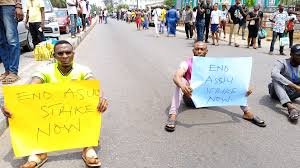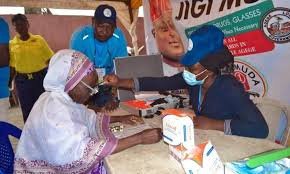
Nigerian students protest prolonged ASUU strikes, demanding immediate government action to reopen universities. (Image: Internet)
ABUJA, Nigeria – Nigeria’s university system is once again on the brink of collapse. At the centre of this crisis is the Academic Staff Union of Universities (ASUU), whose repeated strikes have paralysed campuses and crushed the ambitions of millions of young Nigerians. At the heart of the problem lies not the lecturers’ demands, but the federal government’s chronic neglect and broken promises.
From the bustling streets of Kubwa to the university hostels in Gwagwalada, the human toll is undeniable. Students’ dreams are suspended, parents sink into debt, and traders who depend on campus life watch their businesses collapse. In this report, Juliet Jacob, explores how years of federal inaction have created an educational tragedy that is crippling Nigeria’s economy and eroding the nation’s future.
A Crisis Decades in the Making
Founded in 1978, ASUU has waged a decades-long struggle for fair wages, better facilities, and university autonomy. But successive governments have ignored binding agreements, leaving campuses in disrepair and staff underpaid. The infamous 2022 strike lasted eight months, wiping out an entire academic year.
Today, in 2025, students once again face uncertainty as warning strikes sweep through universities in Abuja, Enugu, and Ibadan.
Broken Promises and Brain Drain
Prof. Chris Piwuna, ASUU President, said, “Not a single agreement we reached with the government has been honoured. What remains is for them to commit—not just negotiate.”
He linked neglect to mass brain drain: “In my hospital, 20 consultants left in two years. Universities abroad are full of Nigerian lecturers because salaries here are too poor to retain them.”
With fewer than five Nigerian universities ranked among Africa’s top 1,000, ASUU argues the strikes are not selfish but a desperate defence of education itself.
Students’ Voices: Dreams on Hold
At the University of Abuja, final-year student Loveth Ani voiced her despair: “We’ve lost so much time. How many more years must we waste before leaders take education seriously?”
Her colleague Susan added: “Our future is in limbo. The government must act, or we’ll keep drowning in uncertainty.”
Families in Crisis: Parents Speak Out
Parents, too, feel the pain. Mrs Eugenia, a civil servant in Kubwa, lamented:
“By now, my son should be nearing graduation. Instead, this warning strike has derailed everything. I even had to remortgage my land to keep paying fees, yet there’s still no degree in sight. It’s heartbreaking. We send our children to university for progress, not endless delays. The government must break this cycle once and for all.”
In Apo, Mr Paul shared: “My daughter’s law degree is derailed. Every lost year costs us ₦200,000. Families are collapsing under this burden.”
Strikes and Local Economies: Case Study of Abuja
Each strike devastates small businesses. Food vendors, booksellers, and transport operators lose livelihoods overnight.
Mama Chioma, a food seller, recalled: “During the last strike, I lost more than ₦500,000. No students, no business. Who replaces that income?”
The Abuja Chamber of Commerce estimates campus shutdowns drain over ₦1 billion from the local economy per strike.
Economic Fallout: Stunted Growth and Skills Gap
Economist, Dr. Amina Yusuf warned: “Over 200,000 graduates are delayed annually. The workforce suffers from deep skill shortages, especially in healthcare and technology.”
The ripple effects include Billions lost in GDP each year
Youth unemployment at 40%, worsened by disrupted calendars
Rising crime in university towns during strike periods
Expert Analysis: Criminologist Dr Akoji Ocheja Speaks
Dr Ocheja, criminologist at NOUN, told Africa Health Report, “There is a direct link between strikes, idleness, and rising crime. Many students fall into drugs, cultism, and crime because their futures are uncertain.”
He also criticised Nigeria’s priorities: “Nigeria pays professors $366 a month. South African professors earn $4,789. Meanwhile, senators here take-home millions. It is a structural injustice.”
Possible Solutions: Breaking the Cycle
For Ocheja, lasting solutions must go beyond temporary negotiations:
“Strikes can be averted by resolving the underlying cause—poor budgetary allocation. Long-term policy for prevention includes increased budgetary allocation, serious government commitment, proper monitoring of funds, global research and innovation exchange programmes, and staff welfare to attract world-class teachers.”
He stresses that recurring strikes represent not just an educational crisis, but a national development threat:
“Every prolonged strike delays the entry of thousands of graduates into the labour market. Professions like medicine, engineering, and law suffer manpower shortages. The economy loses productivity, innovation stalls, and Nigeria falls further behind.”
He warns that the competitiveness gap between Nigerian graduates and their global counterparts grows wider with each disruption:
“While graduates abroad complete their studies on time, Nigerian students spend six to seven years on a four-year degree. This lag discourages international collaboration and makes employers abroad question the credibility of our degrees.”
Recurring ASUU strikes are not mere labour disputes—they are national crises. Until the government funds education as a pillar of development, Nigeria will continue producing half-baked graduates, eroded institutions, and wasted futures.
Dr Ocheja issued a stark warning: “Unchecked, this crisis will relegate Nigeria to the margins of global development. Universities are collapsing before our eyes.”



